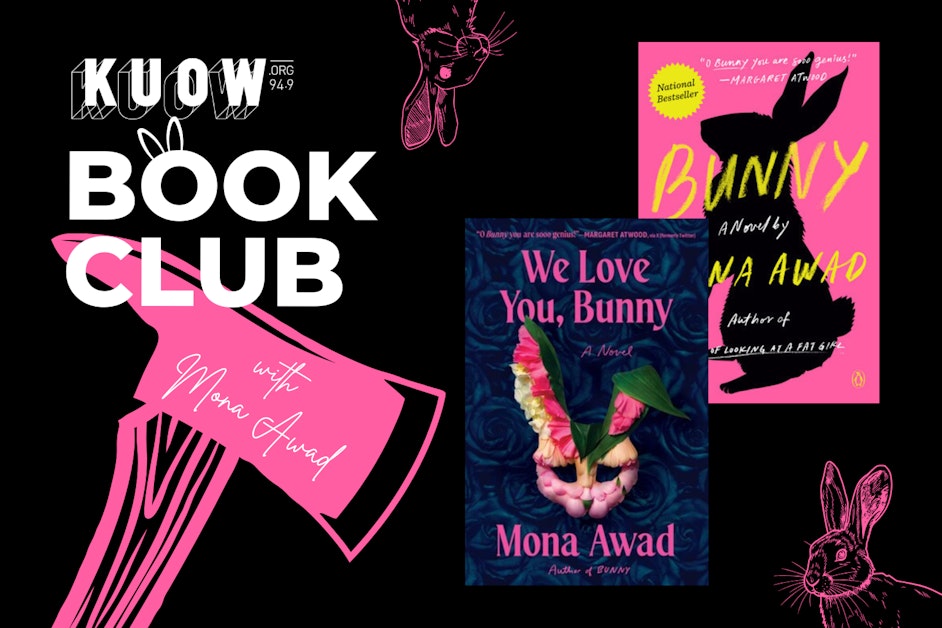If you’ve read Mona Awad’s 2019 novel “Bunny,” you may not be surprised to learn she’s a bit skeptical of tightknit friend groups.
“There’s just something innately fascist to me about a group,” she told me on this week’s episode of Meet Me Here.
RELATED: Check out KUOW’s arts podcast ‘Meet Me Here’
It’s in the way “the self gets absorbed,” she explained, the way you can lose yourself to the group, its likes and dislikes, its desires and fears.
“That can be a beautiful thing,” Awad said, “but that can also be, like, a cult.”
A cult kind of like the core friend group in “Bunny” and the upcoming sequel-prequel-hybrid, “We Love You, Bunny,” which will be released on Sept. 23. The “Heathers”-esque clique in the books is a group of women enrolled in a prestigious MFA program. They’re always complimenting each other in their too-sweet way, always touching, always together in a way that makes them more of a unit than individual people. They call each other “Bunny” rather than using their names. And their way with each other comes across as juvenile and deeply unsettling — especially to the outsider in their cohort, Samantha.
“For a long time in my head, the book was about clique of girls, and I knew that the storyteller, the perspective we would occupy was an outsider who was observing that group from afar,” Awad said, “Then, [the outsider] had an opportunity to find their way in, and it changed them.”
That’s an understatement.
When Samantha is suddenly welcomed into the Bunnies, things get weird. Like, really weird.
RELATED: Step into author Kim Fu’s ‘dream version’ of the PNW
No spoilers ahead, but the books involve a sort of witchcraft and a whole lot of trigger-warning-worthy themes, like self-harm and manifestations of mental illness. In “Bunny,” we experience the surreal horror of it all through Samantha’s eyes, getting a truly grotesque view of what the Bunnies are up to. And in “We Love You, Bunny,” it’s their turn to tell the story.
But no matter who’s telling the story, one thing is clear: This MFA program is full of bad vibes.
Awad experienced some of those bad vibes herself when she was in grad school.
“It’s like a hothouse of envy, ambition,” she said of that setting. “You’re a young artist. You’re a young creative. You’re trying to find your voice. You’re trying to find your way in the world. You’re trying to make your claim. And you encounter all of these people who are trying to do the very same thing. They want the very same thing that you want. And I think it makes you anxious, you know? And so, certainly, I was anxious when I went into my MFA. I was terrified that I would lose my voice, that I would lose, like, my authenticity.”
And that made her vulnerable to group dynamics.
“It kind of brought out the worst in me in a lot of ways,” she said.
Luckily for Awad, it also made for a great premise to work from.
Unluckily for her character Samantha, that premise gets even wilder — and more dangerous — in “We Love You, Bunny.” I’ve been reading the sequel-prequel ahead of a conversation I’ll be having with Awad on Sept. 29 at Third Place Books in Lake Forest Park.
RELATED: Subscribe to the KUOW Book Club newsletter here
“Surreal” just happens to be the best word I have to describe it, but that doesn’t quite cut it. Neither does “horrific” or “unsettling” or “WTF!” I may not be an authority on Awad’s voice, but I feel confident in saying she held onto through her MFA experience, no matter what any real-life Bunnies might have done to try to break her.
Her characters are pretty, well-read versions of Frankenstein’s monster, desperate to find companionship yet terribly afraid of rejection. Set aside their fascist group dynamics, their egomaniacal ways of seeing the world, and their bananas brand of magic (if that’s even the right word for it), and they’re pretty normal young women.
“We’re all longing to connect,” Awad said, “and we’re all longing to connect in a way where we will be accepted, like all of our stuff is just going to be accepted by someone. But, you know, there’s a limit to how much someone else can take of you.”
If there’s a lesson to the “Bunny” books, it’s that. And, maybe, reconsider that graduate application, Bunny.

